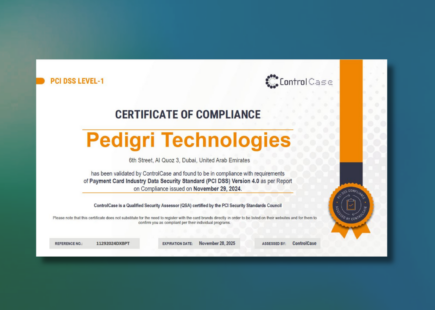Video Interview: Navigating Medical Equipment & Spare Parts Supply Chain Complexities in MEA Region
29 October, 2021In our recent datasheet, we analyze the important industry benchmarks to answer a common question of all supply chain leaders.

In today’s economy global medical equipment manufacturers function in a complex, dynamic, and highly competitive environment. They should look beyond their own national boundaries and existing sales regions and enter other growing markets, like Middle East & Africa. Managing the supply chain across the Middle East and Africa can be challenging and has its complexities.
We’ve invited Ali Can, Senior Quality & Regulatory Affairs Manager at Philips Healthcare, and Pramod Kattel, CEO of Pedigri Technologies, to cover the most important supply chain complexities in MEA and discuss proven ways to address them.
Pramod:
Based on your extensive experience in MEA what do you feel are the most significant challenges to global medical equipment manufacturers entering and operating in the MEA?
Ali:
I can’t disagree that the world has changed drastically and manufacturing organizations are under enormous pressure to create an outstanding product and a faster go to market strategy. But despite the positive side of gaining access to such an attractive market as MEA, international trade usually means high-risk operations due to the local ever-evolving regulatory environment.
And I think the first biggest challenge are complications associated with imports & regulatory compliance
Regulators in each country in MEA impose specific local regulations and requirements on companies doing business overseas, for which a lot of them are not prepared.
Customs rules for import and export are widely different from country to country. And not all trade participants are expected to know these rules and comply with all requirements.
Companies need to adopt end-to-end trade compliance during their supply chain process to ensure their products comply with the regulations of different authorities.
Non-compliance carries heavy penalties that include expensive fines, increased scrutiny, frequent audits and the possibility of shipments being held or denied entry.
Global Supply chains involve complex systems and multiple stakeholders among countries and organizations. Third parties like specialized supply chain firms and service providers are critical members of the global supply chain, helping businesses simplify trade by using their local market know-how, reduce costs, and minimize risks to achieve faster go-to-market, better Field Support SLAs, and improved ROI.
Pramod:
Multiple manufacturers are struggling with this challenge, and we, as the 5PL provider, step in to address them.
Complex regulations in the MEA region demand expertise in trade compliance to import and export products in a fast and efficient way. At Pedigri Technologies, we came up with unique solutions for import & export clearance across 40+ countries in the Middle East and Africa.
When it comes to product trade compliance, we cover critical areas such as:
- Importer of Record: we make sure that complete and accurate information is provided to the regulators for all inbound/ outbound shipments
- Ensuring compliance with import/ export regulations in the country
- Liaising with regulatory authorities for customs approvals and clearance
- Obtain the required permits and licensing from regulatory authorities in each country (e.g: TRA, MOH, FDA etc.)
- Prepayment of the relevant taxes, duties, import brokerage and other fees for the goods to be imported/ exported
- Clear Shipments via relevant customs channels
- Maintaining records as per the law
In key markets like the UAE, we can reduce shipments’ import time from a few weeks to a few days. This has substantially helped manufacturers reduce their in-country inventory holding and improve their field support SLAs.
Also, we know how important yet complex is a speedy product classification/ registration for a faster go to market. That is why we cover initial product classification & registration services with regulators in the MEA region. We act as an independent service provider for product classification & registration services for manufacturers. This allows to minimize the traditional dependency on their distributors and to avoid any possible channel conflicts.
Ali:
The second biggest challenge that every manufacturer in MEA is facing is real-time supply chain visibility. Traditional means of executing operations and having the headquarters far from the region are some of the primary reasons behind poor visibility. Some IT systems work in silos. And all this makes it extremely difficult for supply chain and logistics stakeholders to get a holistic picture of all that is happening on the ground.
In the case of traditional supply chain and logistics management, when an order moves from a warehouse to a central hub for final dispatch to customers, there is little or no real time-in-transit visibility of those orders. This happens majorly because the warehouse management systems (WMS) and the systems being used by 3PL providers are not interoperable. Similarly, a transport management system (TMS) is not in sync with an inventory management system, an order management system (OMS) lacks interoperability with TMS, so on and so forth. Poor visibility results in a series of inefficiencies within a supply chain and affects timely decision making.
Integration of partners and systems and sharing of relevant data back and forth in the value chain is crucial!
And if this doesn’t happen, the problems that come with poor visibility gradually affect the business’ revenue, efficiency, productivity and customer experience.
Pramod:
To avoid this, we provide a great omnichannel experience, one that encourages customers’ loyalty and optimizes profitability. We have developed one of the most technologically advanced AI-based planning, logistics and fulfilment software platforms (PRODIGY) for the MEA region.
This allows vendors to view in real-time the shipment movement, stock availability, consumption patterns, stock ageing in various Forward Stocking Locations (FSLs), as well as predictive forecasting for replenishments. Deliveries are done for Mission Critical Spare Parts 24x7x365 within 2 Hrs / 4 Hrs drives, next flight out (NFO), next business day (NBD) SLAs.
It works based on 3 major components:
1. Traceability using RFID Tags and Robotic Process Automation
- Ability to tag the spare parts/ products using RFID labels with bar codes/ QR codes
- In-house robotic process automation for the RFID labelling, batch product pick, invoicing and auto-verification of packed box contents with invoice/delivery note
- Ability to offer 100% accuracy on delivery of products v/s orders/ pick list
2. Real-time High-Value Asset tracking through GPS Technology
- Suitable for high value parts for real time tracking across various stocking points
- Important for high security risk markets
- End-to-End real time visibility for high value shipment movements
3. Last-Mile Delivery
- Real time visibility of Last Mile Delivery & proof of delivery status updates for both the Vendor and the Customer
- The Track and Trace feature shows the current status of a specific order at any point in time
This approach to supply chain management provides an up-to-the-minute view of the flow of goods from PO to a distribution center and to end customers.
Ali:
And I believe that the third challenge is definitely inventory management & planning, and the availability of the right inventory at the right place.
Serving spare parts for mission-critical medical equipment is a tough challenge. Clients tend to be very pressing, yet the sales volume per part tends to be low, while the number of requests tends to be very high. All these elements combined lead to low inventory turns and, frequently, to dead inventory as well. The result is high working capital and high end of life inventory write-offs while still suffering from field service-limiting stock-outs.
To ensure efficient inventory planning, manufacturers need to be flexible and fast. One way to address this challenge is to drive automated processes that are responsive to variable demand. The right technology enables agile and responsive supply chain management.
Pramod:
Our cloud-based PRODIGY software platform has Advanced Predictive Analytics and Machine Learning abilities to ensure we collaborate with our vendors to develop the most efficient supply chain processes. Our Forecast as a Service (FaaS) helps to accurately predict demand at a granular level for inventory, by using AI-enabled predictive analytics. The use of real-time information, machine learning and artificial intelligence to sense demand considerably reduces forecast errors by an average of 30-40%, allowing vendors to better serve their customers and carry less inventory. It provides real-time visibility of inventory, stock ageing, End-to-End visibility of shipment movements, consumption patterns, KPIs/ SLAs through AI-enabled dashboards.
It also has the ability to maintain products based on batch, serial number, expiry date, software version, country of origin, revision on part codes, multi-currency, FIFO, FEFO.
Deep machine learning algorithms improve forecasting accuracy, enabling vendors to manage operations with 20-30% less inventory and a substantial reduction in working capital.
Improvement in visibility enhances financial viability. Our import & export solutions also complement the inventory rotations between countries in MEA to ensure the optimal usage of working capital for medical equipment manufacturers.
And our intuitive AI dashboard manages vendors’ inventory proactively & maintains optimal inventory levels.
To learn more about our solutions for medical equipment manufacturers visit https://www.pedigritechnologies.com/medtech/ or contact us at info@pedigritechnologies.com
Latest news

Pedigri Technologies Achieves PCI DSS Certification
Pedigri Technologies is pleased to announce its successful attainment of PCI DSS (Payment Card Industry Data Security Standard) Level-1 compliance.

The AI Revolution in Spare Parts Inventory: Transforming Supply Chain Management
Imagine the chaos when a critical spare part is unavailable when needed most. It’s a familiar scenario to many leaders that still rely on outdated inventory management systems. But for those daring to venture into the new era of AI, the story unfolds quite differently.

The Imperative of Denied or Restricted Party Screening in Supply Chains
Imagine the supply chain as a complex network of blood vessels in a living organism. Just as the health of an organism depends on the purity of what flows through these vessels, so does the health of a supply chain rest on the integrity of its participants.
